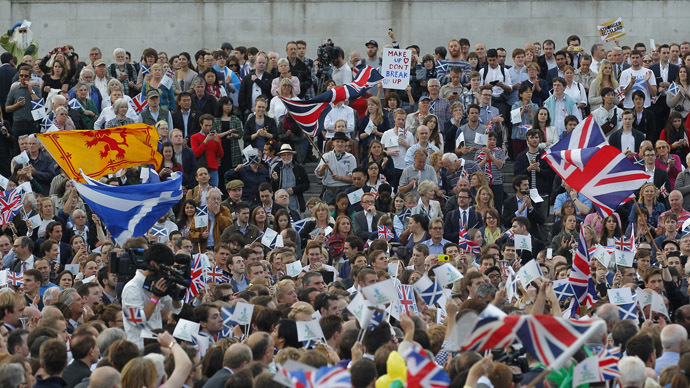'Scottish Independence Referendum: Separatism is an ugly business'

Separatism is an ugly business. History leaves no doubt of this. And even the most established and mature democratic society can find itself rent asunder when it takes root.
With the clock ticking down to 18 September and the referendum on Scottish independence, the tension, anticipation, and excitement in communities the length and breadth of Scotland is of a kind rarely experienced.
The people of Scotland are living through one of those rare moments in a nation’s history when politics hasn’t just assumed an importance it normally never has in the lives of the majority of its citizens, it is the only thing that matters.
Though I believe that independence would be a step back rather than forward for the majority of people affected by it - specifically working people throughout the British Isles, due to the realities of neoliberalism and the race to the bottom that would be the result - the Yes campaign has been impressive. It has brought tens of thousands of people into politics and political engagement for the first time, particularly those who hitherto had felt disenfranchised, left out and left behind, taking on the mood of a democratic insurgency in the process. It has mobilized the young, the old, disabled, poor, and idealistic alike.
In working class communities across Scotland the proliferation of Yes posters in windows, Yes stickers on cars etc, is evidence of a growing association between independence and the need for change - real change, too, not just the tinkering round the edges of a system which rests on foundations of poverty, alienation, and despair. In the main it has been a joyous and hopeful and positive campaign, a glowing testament to the possibility of a grassroots political mobilization within a mature democracy.
However this upsurge of hope and passion on the part of those for whom both have rarely if ever been a feature in their lives, brings with it attendant risks. With the polls placing both sides neck and neck, combined with the stakes involved, it is incumbent on the political leaderships of both campaigns to try to control a temperature that has risen over recent days, or else make the possibility of this joy metamorphosing into something ugly a reality.
A recent spate of warnings issued by financial institutions, major retailers and businesses over the negative impact of a Yes vote have been met with inevitable disdain by the Yes campaign, posited as a last ditch and desperate attempt by the establishment and those with a vested interest in the status quo to derail its momentum. But some have gone further than treat those warnings with disdain. Some - high profile figures and supporters of Scottish independence - have come out with warnings of their own, with talk of ‘days of reckoning’ and ‘stark consequences’ being aired in public, whipping up anger which in the hearts of those for whom September 18 has come to assume the promise of nirvana, could well make September 19 and the days following days that Scotland will live to regret.
The possibility of ugliness supplanting hope is only increased with the result poised so closely. If, as seems likely, victory and defeat on September 18 is separated by just two or three points, the likelihood is that many on the losing side will find it hard to accept a slim majority as a solid mandate. This is especially the case when it comes to Yes voters and supporters, whose passionate belief in the transformational properties of independence will be shattered.
This is not to say that the risks of disappointment and devastation spilling over into ugly scenes of disorder lurk on the Yes side of the equation alone.

Last Saturday Edinburgh played host to massed ranks of Orangeman marching through its city centre, providing us with a stark reminder that not all traditions deserve to be kept alive. The Orange Order was founded in the late 18th century in the North of Ireland to help quell rebellion. The organization spread to Scotland thereafter, where it remains rigidly devoted to the antiquated belief that Scotland’s Irish Catholic community is intent on destroying their Protestant beliefs and traditions. Though you won’t find Scotland’s history of religious bigotry and sectarianism featured in tourist brochures, it hasn’t gone away; and who knows in what shape or form it might manifest in the case of a Yes vote among those for whom the Union is sacrosanct and a vote suggesting otherwise tantamount to treason.
In the course of this campaign a multiplicity of contradictions have come to the fore – the glaring chasm between rich and poor; the extent to which Westminster is reviled; years of social and economic injustice; and the need for change. Anti-politics and anger has been given opportunity for democratic expression, and has combined with idealism and an appetite for justice that will not easily dissipate on September 19 in the event of a No vote.
Democracy in the UK is about to undergo a rigorous test. Most on either side of the Scottish independence debate will be hoping it emerges intact.
The statements, views and opinions expressed in this column are solely those of the author and do not necessarily represent those of RT.
The statements, views and opinions expressed in this column are solely those of the author and do not necessarily represent those of RT.













